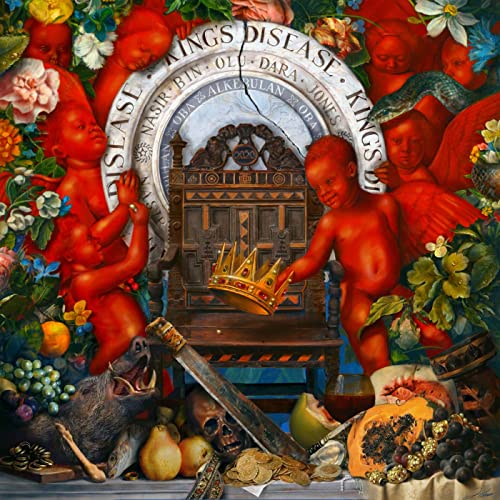Nas was old before his time. The New York rapper’s illustrious debut ‘Illmatic’ has partly stood the test of time due to this fact – it has defied ageing, because it already felt mature, the work of an old soul on steely streets. Brought back into the creative maelstrom with 2018’s Kanye-produced ‘NASIR’, the illustrious rapper claims a regal place within hip-hop culture on his new album, one that deals with cultural fissures from a position of experience and maturity.
Hit-Boy executive produces ‘The King’s Disease’, a project that neatly re-frames Nas’ discography as a mixture of the jazzy beats that fuelled ‘Illmatic’ and buoyant digital bounce. It’s a decision that makes a lot of sense, neatly evading the aesthetic pessimism of ‘Hip Hop Is Dead’, say, or the infamous (if enjoyable) Toto’s ‘Africa’ sample on ‘Nastradamus’.
The title is a reference to gout, but also serves as awareness of potential alienation from his community; on every track, Nas feels connected, an artist working with a full awareness of the importance of his actions.
The album release was led by the blistering ‘Ultra Black’, a statement on Blackness as something tangible and immortal, cross-referencing rhythm ‘n’ blues with Grace Jones in the process. A bold moment, it’s the perfect lead-in to an album whose themes are timely, though its message can be difficult to immediately process.
Opening with the title track, Nas’ bars can be a barrage of information; he’s unafraid to dole out messages on Big Topics, revelling his role as educator and elder statesmen. The choice of collaborators is key, too; an act of cultural curation, it places Nas amongst an array of cutting edge rappers, his influence pushing them into a fresh sphere.
Take Lil Durk’s guest spot on ‘The War Is Won’ – his voice is layered in arena-ready effects, but the lyrics are strikingly immediate, referencing Black Lives Matter and the societal flux of the past six months. Fivio Foreign and A$AP Rocky raise the levels on climactic closer ‘Spicy’, while Brucie B’s guest spot on ‘The Definition’ comes close to defining the heart of the record.
It’s not all successful, though. Anderson .Paak is fairly anonymous on ‘All Bad’, a curious misfire given how naturally the pair’s jazz-leanings would intersect. ‘Car #85’ boasts Charlie Wilson, but the downcast song doesn’t quite hit the heights to be found elsewhere on ‘The King’s Disease’.
Indeed, the record is at its best when Nas is alone, left to proselytise and spread his message. It’s his bars on ‘The Definition’ which cut deepest, while the sharp poetry of ‘27 Summers’ combines emphatically with the digital dystopia in the low-end heavy production.
An artist grappling with his own legacy before his time, ‘The King’s Disease’ finds Nas willing to prove himself alongside artists from a new generation, while retaining links to his own work. It’s a dynamic which finds full release on ‘The Cure’, with its Shakespearean hark-back “what’s in a name?” turning the focus on to his own identity. A meditation on ageing and the shifting position of the artist, it even name-checks the Beatles, discussing their alternate paths before admitting “Lennon’s the hardest…”
‘The King’s Disease’ finds Nas grappling with a raft of contradictions, contrasting the opulence of his lifestyle with the need for vitality in his message. It’s not perfect, but it’s less an end product, and more the search for creative process – by the end, you become convinced the Queens rapper has found his throne.
8/10
Words: Robin Murray
– – –
– – –

